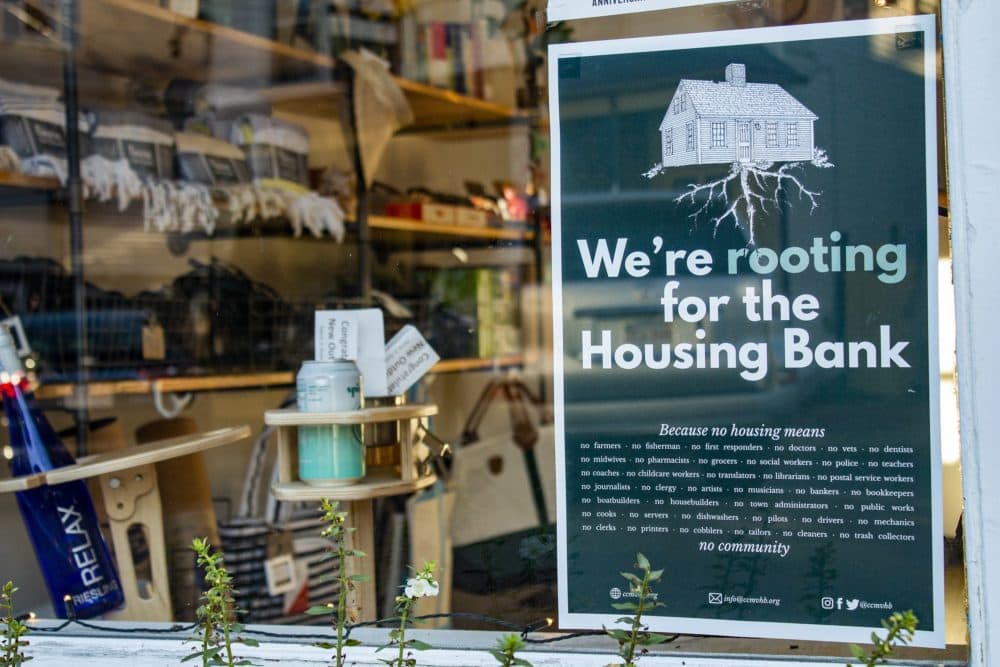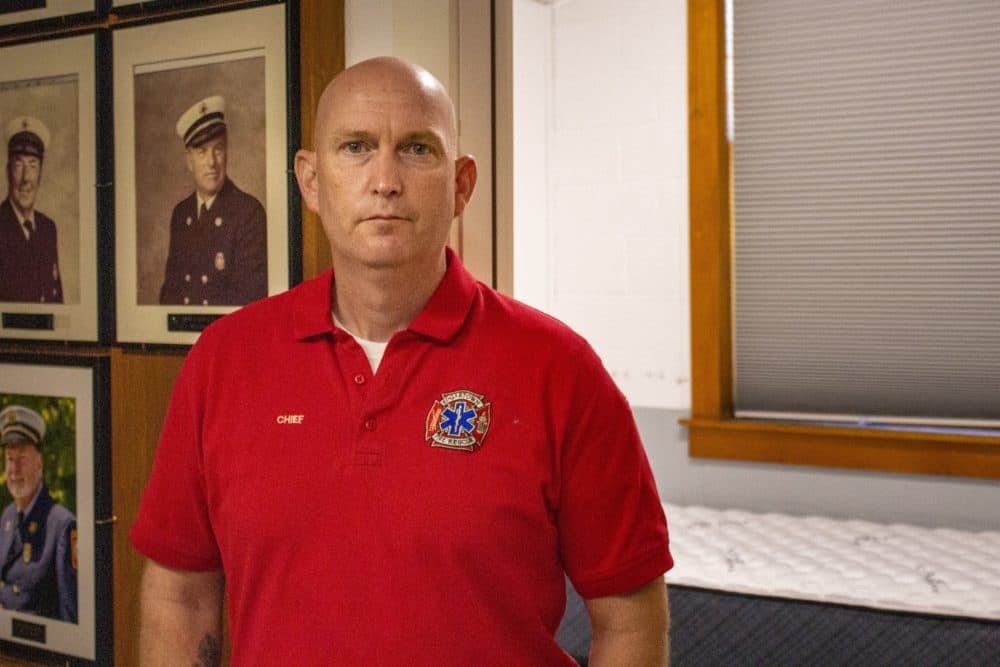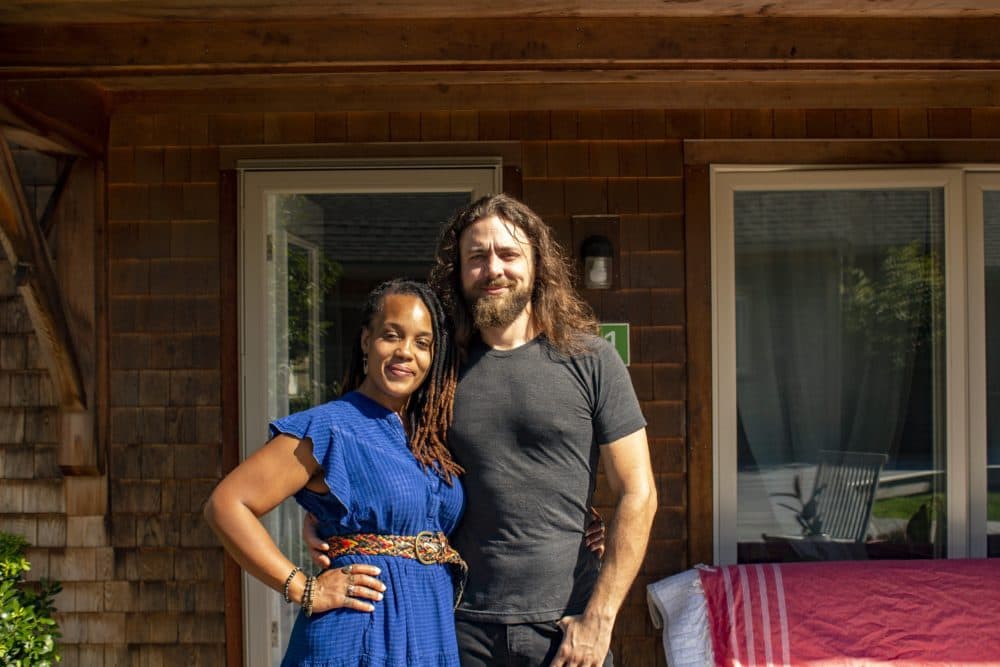Advertisement
The pandemic has turned Martha's Vineyard's housing crunch into a crisis

From Boston to Cape Cod, home prices have skyrocketed, but on the islands of Martha's Vineyard and Nantucket, it’s even worse.
On the Vineyard, the year-round population has been growing for years — and housing prices with it. But in spring 2020, that slow stream of new-comers became a flood as people moved there to escape the pandemic — and there have been consequences.
“The housing crisis that we face and we have continued to face, which is now escalated because of COVID and the increasing property values, has made it at critical mass," says Cheryl Andrews-Maltais, chairwoman of the Wampanoag Tribe, whose ancestral lands lie in the town of Aquinnah on the island's western end.
Aquinnah's year-round population grew by more than 40% over the past decade, and the island's five other towns have also experienced double-digit growth. According to the 2020 census, more than 20,000 people now call the Vineyard home (that's about a 24% increase in population over the past decade).
Last year, Martha's Vineyard's median home price also surged past $1 million for the first time.
Andrews-Maltais and others say some people have been sleeping in their cars, camping in friend's backyards, the state forest — wherever they can find a place to spend the night.
"Look in the newspapers and in the real estate. There's no year-round housing. Only a couple of towns have maybe one unit and it’s a weekly rental or for the month," she said. "So our tribal members are being forced to move off the island, and not just our tribal members — families that have lived on the island all their lives, for generations. We're unable to even hire people to fill the jobs necessary to provide our programs and services because there's just no place for them to live."
One of the people leaving is Noavakay Knight. She has lived on the island her entire life, raised with four siblings by a single mother in Vineyard Haven.
“This system, it kind of feels like a gilded cage these days. We can't really, you know, make enough to do anything but work.”
Noavakay Knight
Knight and her husband, a painting contractor, once hoped to buy property of their own on the Vineyard, but those hopes died in 2020.
"I've seen some people be able to survive and make it work here, but mostly only people that have generational wealth," Knight said. "And you know, before maybe we could still dream of being able to afford a tear-down at $400,000, but now a tear-down is $900,000.”
The Knights and their toddler have been living rent-free on the summer estate of a Manhattan family, in exchange for managing the property. Knight acknowledges they lucked into a good situation, but says depending on the good will of others is not a long-term housing solution.
“This system, it kind of feels like a gilded cage these days," she said. "We can't really, you know, make enough to do anything but work.”
Now they've put money down on a house in western Massachusetts, where the cost of living is much lower. Knight will be the last of her siblings to move off island.
Advertisement
And as people leave the island, the social fabric is unwinding, according to long-time resident Laura Silber, who built her house in the town of West Tisbury 23 years ago.
“When the median home price goes over a million dollars, things change permanently," she said. "And you know, it’s heartbreaking — and it is the end of an era.”
Silber was drawn to the island in the early '90s by a thriving arts scene and a lifestyle anchored by community and mutual aid.
"We had this really thriving, vibrant arts community," she said. "Young people would come here and you really could live here very reasonably; it was just wonderful.”
And it isn't just artists and bohemians who are struggling to make ends meet on the Vineyard. Silber and others say teachers, health care workers and other professionals now routinely turn down offers to work there because they can't find anywhere to live. Wait times now run months for essential services: plumbers, auto mechanics, veterinarians. There's a crunch to keep firehouses staffed.

Alex Schaeffer is chief of the Edgartown Fire Department, which, like others on the island, functions mostly in thanks to “on-call” fire brigades — volunteers who receive a stipend for their service.
Shaeffer says there have always been ebbs and flows in staffing — but never like this.
“Up until last year, it was never even a consideration in terms of, ‘Oh, we have membership that lives within town and we can draw off of them when we need, in a high time of crisis,' " Schaeffer said. "But now we’re just lucky to have people living on the Vineyard, let alone in our own community.”
When four of Edgartown's volunteer firefighters moved away earlier this year, Schaeffer had to wall off bunk rooms in the fire station’s common area — so those same volunteers have a place to sleep when they commute back for their shifts.
Arielle Faria, an administrator at the Edgartown Affordable Housing Committee, notes that commuting isn't realistic for most people.
“It’s an island! We don’t get to go to the suburbs," she said. "There will be no police officers, and nurses, and teachers ... and your gas station workers. How do you [sustain a community] without housing people?”
Faria, who moved to the Vineyard from Cambridge more than a decade ago, is herself a benefactor of affordable housing. She lives with her husband and two teenage sons in Scott's Grove, a nine-unit community in West Tisbury, built in 2018 by the nonprofit Island Housing Trust. Scott’s Grove contains nine of more than 100 affordable homes and apartments the trust managers, scattered across the island's six towns — with many more in the works.
But the vast majority of this housing is reserved for people with lower incomes (those earning 80% of the median income in the county), and these days, middle-income and even higher-earners aren't able to afford housing on the island.
Faria and others note that along with wealthy home-buyers driving up prices, private entities have been buying up properties and turning them into vacation rentals at exorbitant rates.

Faria and Silber are both members of a coalition trying to create a Martha's Vineyard Housing Bank. They're working with groups around the state, including in Nantucket, Boston, Truro and Somerville, to try to fund affordable housing through an additional tax on high-end real estate transactions.
The Housing Bank coalition hopes this so-called "transfer fee" could contribute to projects funded for more middle-income families as well.
“The islands are like the canary in the coal mine ... don't wait until your [town's] median home price gets to $1.3 million, because you have so many fewer options once it gets here.”
Laura Silber
In the meantime, the island's six towns are trying to work together to solve the housing crisis. Jeff Kristal is a select board member in the town of Tisbury.
"I think we have a lot of people who are very dedicated to the cause of finding a solution, and not just the housing banks," Kristal said. "I think we have our affordable housing committees that are doing it. I think there are planning boards that are meeting and discussing it regularly. We have selectmen who continue to push the agenda forward in all towns."
Kristal says he supports the effort to create a Martha's Vineyard Housing Bank, along with relaxing some zoning rules to build more housing.
Silber says the rest of the state should take notice.
“The islands are like the canary in the coal mine," she said. "I would advise other towns in Massachusetts ... please don't wait until your median home price gets to $1.3 million, because you have so many fewer options once it gets here.”
Still, Silber has high hopes for a pair of bills on Beacon Hill that would enable cities and towns around Massachusetts to start housing banks of their own.
Rep. Dylan Fernandes, who represents Falmouth, Martha's Vineyard and Nantucket in the State House, is a co-sponsor on one of the bills.
"Arguably the biggest short-term issue facing the state of Massachusetts right now are these out-of-control housing prices, causing massive insecurity for families around the state," Fernandes said. "All we're asking is for the state to allow cities and towns to impose a 2% fee on multimillionaires paying for multimillion-dollar homes that can go into affordable housing banks that meet the needs of local communities. I think it's an incredibly fair and reasonable thing to ask for, and given the state of our housing crisis, absolutely the right thing to do."
But even if the legislation moves forward in 2022, Fernandes admits communities probably wouldn't see the dividends for several years.
With reporting by WBUR's Paris Alston
This segment aired on October 22, 2021.
